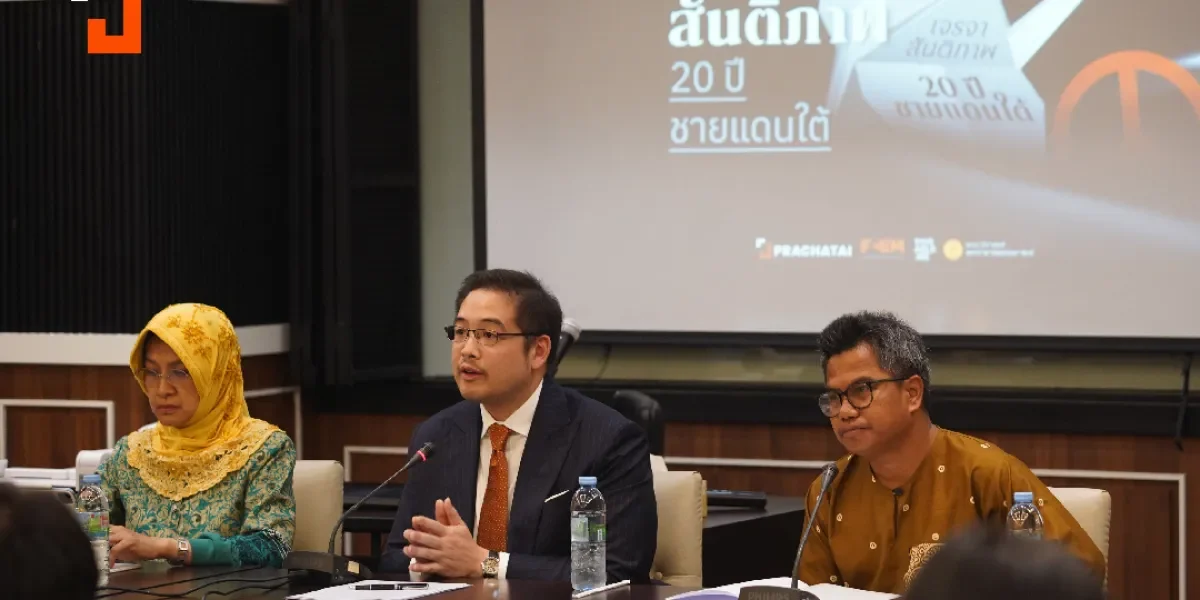The statute of limitations on the Tak Bai Massacre expired on 25 October and, with none of the defendants showing up to court, the trials also ended. Negotiations for peace in the Deep South are ongoing, however.

At a panel discussion of peace talks in the Deep South, held as part of a seminar series organized by Prachatai for its 20th anniversary, Former Bhumjaithai MP Phetdao Tohmina, National Security Council (NSC) security expert Phonthep Thanakoset, and journalist Muhammad Dueramae discussed the peace process and what is needed to move it forward.
Phetdao said that, although the Tak Bai Massacre was a one day tragedy, it left a major wound on people in the Deep South who still want to know who was responsible for the deaths. Noting that in the run up to the statute of limitations expiration, violent incidents have taken place in the area , she advised that security agencies assess the situation carefully.
Phetdao believes that the government can work to build confidence by guaranteeing that such violence will not happen again. More importantly, she feels that the government must learn from the Tak Bai Massacre and similar unresolved incidents.
As for peace talks, she said that if the government wants representative stakeholders to take part, it must guarantee their safety and work to build trust. She also said that instead of allowing security personnel to dominate discussions as they have in the past, the talks need to be more balanced. She hopes the government will consider a report submitted by an ad-hoc committee studying approaches to the Deep South peace process, which includes proposals for government agencies.
Discussing how best to deal with the past now that the statute of limitations on the Tak Bai Massacre expired, she said that emotional healing for people in the area requires a guarantee that the incident will not be repeated. Despite this, however, she notes that security agencies have been preparing to deal with any violence triggered by the case being dropped.
Muhammad, who has spent his career covering conflict in the Deep South, said that it is important that justice be delivered to change the prevailing narrative. He noted that, of the nearly 1,400 security-related legal cases brought in the area, only around 30 found officials guilty of wrongdoing. Half of the cases were also dismissed by the court, raising questions about the judicial process and special statutes like the martial law and the emergency decrees that have been used to bring charges.
He worries that stories of state violence and impunity will be passed to the next generation, triggering more violence in turn. To change this, he feels the government must show that it has the spirit to find out the truth about what happened at Tak Bai.
What is next in the peace talks?
Negotiations for peace in the Deep South have been ongoing for 20 years. Phonthep said that conversations have continued despite changes in governments, suggesting that all parties accept responsibility for the process.
Last year, then-Prime Minister Srettha Thavisin appointed Chatchai Bangchuad as chief negotiator – the first civilian to take the position. Phonthep explained that the negotiating team met with the Patani Malayu National Revolutionary Front (Barison Revolusi Nasional Melayu Patani – BRN) and developed a Joint Comprehensive Plan towards Peace (JCPP), a roadmap for peace in the Deep South. Although details remain to be worked out, the negotiations reportedly touched on justice, administration models, identity, culture, and education.
According to Phetdao, the current government has yet to appoint a new chief negotiator. She hopes that it will do so soon so the process can move forward, allowing different sectors, especially members of parliament, to take part and present information on the needs of local people.
Meanwhile, Muhammad said that the core of the problem is the justice system. He agreed that negotiation is important for resolving issues from the past, but the issue of justice must come first.
He warned that any effort to turn people against each other will never work. He said that the Buddhist and Muslim communities can co-exist, but the government might not understand how important this is to the peace process. He also said that previous negotiations focused on building trust between negotiators, but the work has not been done to build trust with the locals.
A strong political will is needed
Phonthep said that to resolve problems in the Deep South, it is critically important that the government have a strong political will to overcome obstacles. Negotiations must factor in the demands of different sectors. Parliamentarians must amending legislation to promote change, and connect with local communities. Those with power must work together to build a future of peace in the Deep South.
According to Phonthep, all parties involved in the negotiation must remain open to different opinions and not forget that the main goal is change. He thinks that conservative nationalistic fears should be set aside as there is more than one way of loving one’s country and the Constitution is open to diversity.

